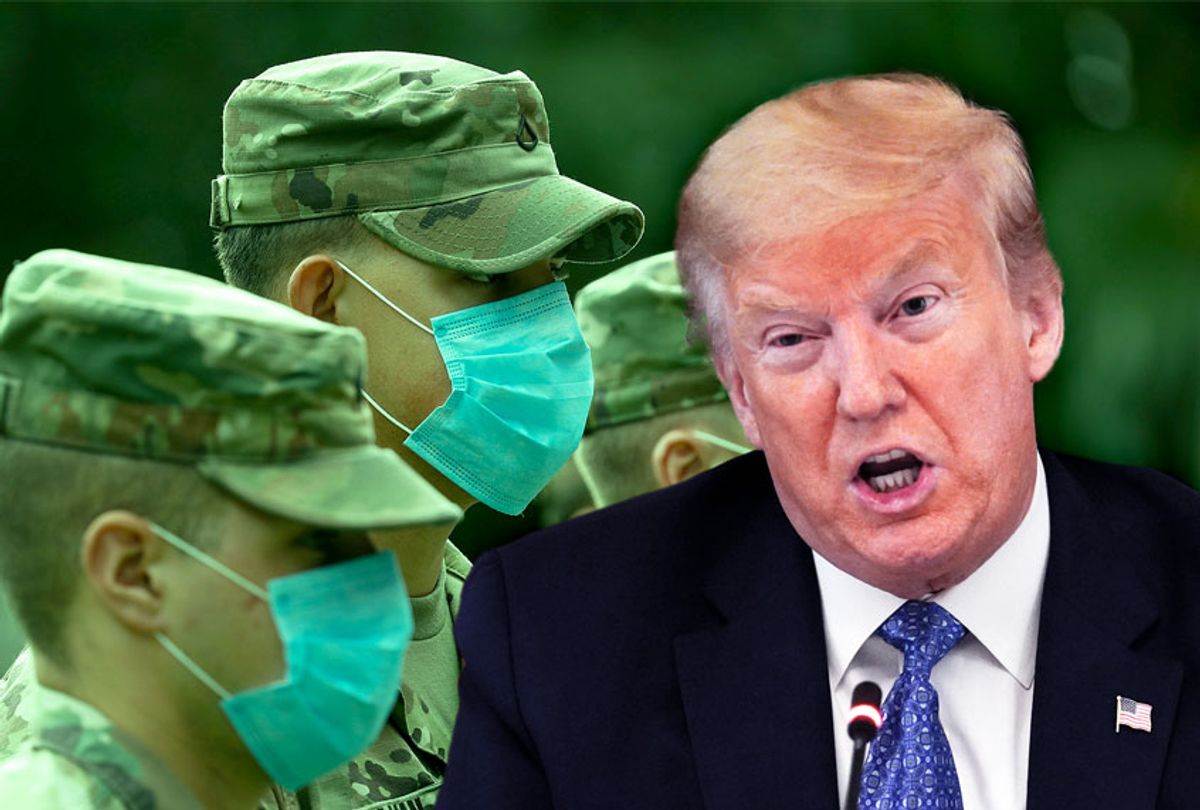Sophia Thomas says she had "had a message to share" during her visit to the White House last week. The president of the American Association of Nurse Practitioners says she doesn't regret relaying that message in front of the president of the United States, earning an in-person rebuke from Donald Trump. Thomas, a Louisiana nurse whose clinic serves uninsured and underinsured patients, told reporters gathered in the Oval Office that personal protective equipment (PPE) for medical workers on the front lines of the COVID-19 pandemic "has been sporadic, but it's been manageable, and we do what we have to do."
Trump shot back, "Sporadic for you, but not sporadic for a lot of other people." He continued, with his arms crossed in front of his chest: "Because I've heard the opposite. I have heard that they are loaded up with (PPE) now."
Thomas made a point of explaining. "I've been reusing my N95 masks for a few weeks now," she said, adding, "We learn to adapt and do whatever the best thing we can do for our patients to get the job done and get the care provided."
A week later, as nurses in Minnesota complained that hospitals were rationing PPE while pursuing elective procedures that put medical workers' lives at risk, Gov. Tim Walz, a Democrat, confirmed at his coronavirus press briefing that the Trump administration was still undermining his state's attempt to procure additional PPE.
"If your nurses are nervous about it, there's probably a reason to be nervous about it," Walz said on Wednesday, telling reporters that a large supply of testing equipment and protective gear on the way to Minnesota was "picked off somewhere in the chain" by the federal government.
Walz's revelation comes more than a month after the House of Representatives opened an investigation into the Trump administration's role — specifically that of Jared Kushner, White House adviser and Trump son-in-law — in hijacking supplies meant for frontline workers across the country to replenish the previously barren national stockpile. The chairs of the House Homeland Security and Oversight committees wrote that they were "particularly troubled that Mr. Kushner's work may even involve 'directing FEMA and HHS officials to prioritize specific requests from people who are able to get Kushner on the phone.'"
The federal government has subsequently failed to share its reasoning or plan with states, forcing some governors, like Republican Larry Hogan of Maryland, to pursue drastic measures to acquire and safeguard life-saving supplies, including enlisting the National Guard to protect the equipment at an undisclosed location.
Only a week after Hogan ordered National Guard troops to Baltimore-Washington airport to escort a PPE shipment to a secure location, the White House released a memorandum ending federal orders for state Guard deployments on June 24 — which happened to be one day short of the 90 days needed to qualify for post-9/11 GI Bill education and retirement benefits. National Guard members must be enlisted for 20 years to qualify for a pension at age 60, but for every 90 days served in a federal emergency, they may speed up retirement by three months and qualify for reduced tuition at public universities.
The National Guard saw a surge in new applicants after Trump called for helping hands amid the pandemic. More than 46,000 Guard members are currently serving in the largest domestic employment since Hurricane Katrina in 2005. They've staffed prisons, stocked local food banks and conducted tests at nursing facilities. More than 1,100 National Guard troops have been diagnosed with coronavirus, according to the Military Times. But according to a call first reported by Politico, FEMA officials called for a "hard stop" to deployment on June 24, specifically to prevent troops deployed in late March from reaching the 90 days of duty credit needed to qualify for early retirement and education benefits. This decision was made even as governors across the country have called for extended National Guard assistance.
The White House has come under swift pressure to back off this particular attack against frontline workers. A group of bipartisan lawmakers wrote to Trump and the Pentagon on Wednesday warning that the June cutoff would endanger Americans. On Wednesday, Democrats in the Senate introduced a bill to ensure Guard members can claim their benefits.
"It makes me sick to my stomach," retired Brig. Gen. J. Roy Robinson, president of the National Guard Association of the United States, said on Wednesday of the Trump administration's reported plans. Hours later, White House spokesperson Hogan Gidley said the administration "will continue monitoring the impact of coronavirus in the states and will work to ensure they are equipped to respond."
While the move to cut off Guard troops from earned benefits is hardly a tactic invented by Trump, it is part of a larger pattern of hostility towards frontline workers like Sophia Thomas, the Louisiana nurse who told him about a PPE shortage.
Along with congressional Republicans, Trump is now dragging his feet on another round of stimulus funding to increase emergency pay for frontline workers. His hotels, as The Washington Post confirmed with city officials in New York, Chicago, Miami, Washington and Honolulu, did not step up last month to help frontline workers — even as the White House's Twitter account praised the 15,000 other U.S. hotels that did house first responders.
Trump's long-running modus operandi, after all, has been to screw every nickel out of every person he possibly can. Republicans in Congress have given him carte blanche, before, during and after impeachment. Now he's exploiting the pandemic to seek retribution against his political enemies — and the frontline workers he praises in public apparently fall into that category.



Shares